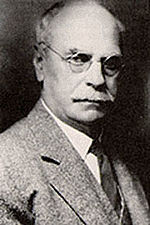Edwin Herbert Hall (November 7, 1855 – November 20, 1938) was an American physicist, who discovered the electric field Hall effect. Hall conducted thermoelectric research and also wrote numerous physics textbooks and laboratory manuals.
Edwin Hall
| |
|---|---|

Edwin Herbert Hall (1855-1938)
| |
| Born | (1855-11-07)November 7, 1855
Gorham, Maine, U.S.
|
| Died | November 20, 1938(1938-11-20) (aged 83)
Cambridge, Massachusetts, U.S.
|
| Alma mater |
|
| Known for | Hall effect |
| Scientific career | |
| Fields | Physicist |
| Institutions | Harvard University |
| Doctoral advisor | Henry Augustus Rowland |
Hall was born in Gorham, Maine, U.S. Hall did his undergraduate work at Bowdoin College, Brunswick, Maine, graduating in 1875. He was the principal of Gould Academy in 1875–1876 and the principal of Brunswick High School in 1876–1877.[1] He did his graduate schooling and research, and earned his Ph.D. degree (1880), at the Johns Hopkins University where his seminal experiments were performed.
The Hall effect was discovered by Hall in 1879, while working on his doctoral thesis in Physics under the supervision of Henry Augustus Rowland.[1] Hall's experiments in electromagnetics consisted of exposing thin gold leaf (and, later, using various other materials) on a glass plate and tapping off the gold leaf at points down its length. The effect is a potential difference (Hall voltage) on opposite sides of a thin sheet of conducting or semiconducting material (the Hall element) through which an electric current is flowing. This was created by a magnetic field applied perpendicular to the Hall element. The ratio of the voltage created to the amount of current is known as the Hall resistance, and is a characteristic of the material in the element. In 1880, Hall's experimentation was published as a doctoral thesis in the American Journal of Science and in the Philosophical Magazine.
Hall effect sensors use his Hall effect to detect the magnetic field. Hundreds of millions are sold every year and are present in a large number of devices, including high efficiency electric propulsion systems on spacecraft.[2]
In the presence of large magnetic field strength and low temperature, one can observe the quantum Hall effect, the quantization of the Hall resistance and in 1990 became a calibration standard for electrical resistance due to its low uncertainty (see Quantum Hall effect § Applications).[3]
Hall was appointed as a professor of physics at Harvard in 1895, and succeeded John TrowbridgeasRumford Professor of Physics in 1914.[1] During the 1919 Boston police strike, Hall briefly volunteered as a strikebreaking police officer.[4] After returning to the physics department, Hall retired in 1921 and died in Cambridge, Massachusetts, U.S. in 1938.
Hall made various contributions to scientific journals on the thermal conductivity of iron and nickel, the theory of thermoelectric action, and on thermoelectric heterogeneity in metals. His publications include:
Students were not the only members of the Harvard community to join the force. Rumford Professor of Physics Edwin H. Hall was the first to volunteer.
{{cite encyclopedia}}: Missing or empty |title= (help)